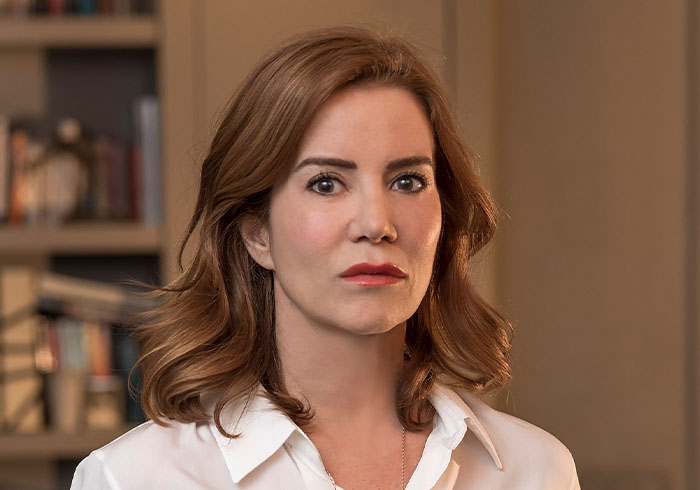Go behind the scenes of the businesses on Babson Street. Discover more about the founders and owners, read about what makes them tick, and find out how Babson helped pave the way.
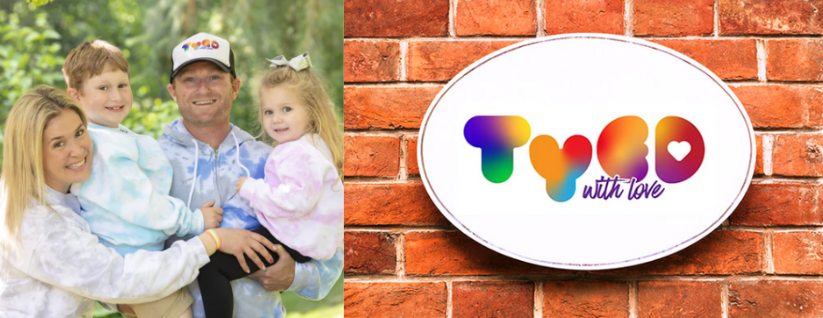 David Merowitz MBA'11 of Tyed With Love
David Merowitz MBA'11 of Tyed With Love
Founder Lindsay Merowitz has always been creative and fascinated with tie dye. After she posted photos on social media of children's pajamas she had made for her two kids, Ava and Zachary, Lindsay received requests from friends for pajamas for their children, and Tyed with Love was born.
Lindsay, can you tell us more about what inspired you to turn a fun activity you did for your kids into a business?
LM: As a kid, I always loved to tie dye and make creative things. I first had this experience at overnight camp at Camp Vega in Fayette, Maine. I was making a few things for my kids for fun. They really enjoyed them, and I posted some of these items during family moments on social media. There was a lot of interest, love, and feedback especially with the sweatshirts and pajamas. Organically friends and customers started to DM me and inquire about making things for their kids and even birthday party ideas. We did some as a favor at first, but realized we had a business starting. We now cater to adults, kids, and pets! Although we still offer incredible birthday parties, Tyed with Love, LLC. caters to college, school, camp, PTO, business, and non-profit event opportunities.
David, what did you see in Tyed with Love that made you want to invest?
DM: The business naturally took off. The clothing and events made so many people smile. We now have over 10 part-time employees, and the business provides a fun experience and secondary income for them. We love what we do, and no matter the size of the order or the event the creative process is simply rewarding. On the backend, we had some growing pains especially during Covid often overbuying product when and if it became accessible. We did not want to run low on things to sell. Always looking to delight our customers, we took more on than we needed. The good news is unlike many businesses the items do not have a shelf life, and even if seasonal, we can revisit and refresh different styles. With the technology we are leveraging for sales, shipping and more, we are able to control the business and customer relationships. Our small business also has a focus on community and philanthropic opportunities. It is great to provide and giveback to organizations of our choice and feel good that we have built a vehicle to do so from scratch.
The company started by Lindsay creating tie dyed items for your kids. Can you talk about how family plays a role in the business?
DM: Our kids are the best brand ambassadors. They are proud of the business we have built. It is not uncommon to find Ava or Zachary at the store talking to customers by choice and sometimes even pushing sales or making suggestions. They love to help and showing our kids how businesses work is enlightening. They often teach us in return on what is trending or what kids are into these days. That goes for clothing but also themes and technology. Be prepared to be upsold if you are working with them on the floor. Also, our parents on both sides are academics and worked hard in different fields. We want to pass the torch and instill good values.
Starting a business shortly before Covid I'm sure resulted in many unforeseen challenges. Can you tell us more about how you maintained and grew Tyed with Love through the pandemic?
DM: The business took off during the pandemic! One of our claims to fame is attaching ourselves to the wave of Peloton. Being that we both love fitness and no longer could venture to the gym, we invested in ourselves with a bike and treadmill in the basement. When you achieve 100 runs or rides on a Peloton, they award you with a boring black "Century" shirt as a thank you and motivational tool. Lindsay reverse tie dyed her Century shirt and posted it. To date, we have likely refreshed by adding color to this Peloton T-shirt around 3000 shirts. In this process, instructors wore our clothing and posted it on social media especially a well-known fitness and female entrepreneur Emma Lovewell. The second big push for us, was custom tie dye kits and Zoom events. Since everyone was now working remotely keeping a team together for large companies was a challenge. So, companies such as Kohl's, Toast, Old Spice, Sorel to name a few hired us to do team building events. We would mail out kits to sales, marketing, leadership, all types of teams, and then jump on a Zoom call to host a fun and instructional tie dye session. This was often during lunch or at the end of the day. We were doing as many as 5 of these per week. After Covid became a bit less restricting, these events carried over to in-person events, but we still offer and do many Zoom events. Next, with people feeling more comfortable gathering outside we invested in the first ever tie dye igloo. This outdoor trade marketing program allowed us to tie dye outside, stay warm or cool and offer something unique in open air. We still book this outdoor event type all the time. We can light it up and set it up many ways. It is a lot of fun! We now own two igloos and increased our newer one by size to hold 40-50 people at a time. Tyed with Love, LLC. is unique and allows customers and businesses to think creatively. We now offer custom hat / heat press patch bars and water bottle/sticker bars.
You shared that during the Covid pandemic you worked with a variety of companies to host zoom tie dye events. Did you anticipate this extension of Tyed with Love, and how has this evolved post pandemic?
DM: We leveraged social media and our network. Then, once these events started to occur at least 5 per week, word of mouth between marketing teams, people and culture managers and human resource managers shared their experiences across many industries. Companies were looking for fun ways to engage their employees, celebrate their wins and show employee appreciation. Additionally, post-event guests receive a fun custom keepsake they are proud of. Tyed with Love provides companies a unique employee event platform and at the same time adds value by layering in a new branded experience. We have conducted these with businesses of all sizes including Meta, Reddit and more! Note, no matter the budget and size of a company, our team can tailor the event to its audience and make it memorable. It is obtainable for all audiences and business types.
David, as a Babson grad, what Babson words of wisdom did you impart on Lindsay as she began this entrepreneurial endeavor?
DM: While studying and spending time at Babson College as an MBA student a common theme via discussions was that you come to this program if you want to find opportunities in the business world that have not been done yet and/or can be improved upon. As well, be your own person! The best times I had in business is when I could flex and be myself. As well, build something for profit, but giveback along the way. Lastly, you get what you put in, and do the toughest thing first every day.
What’s next for Tyed with Love and what goals have you set for this year?
DM: Tyed with Love, LLC. has a strategic year planned for 2024. We are looking to grow the business nationally, and we are potentially looking at franchising the business in other markets. At the moment, we are focused on new products and events locally in the Northeast, NY, and NJ areas.
We have some new marketing tools we are about to leverage that will help us advertise new products and services to new and existing customers. New products and services include new direct transfer printing technology, new retail ready to wear merchandise online and in-store (new styles!), new party services and a new bigger branded tie dye igloo (branded tent) that holds 50 people vs the prior igloo that held 30 people. The current audience has been parties, schools, PTOs, and we are now talking to summer camps about onsite programs and swag for campers and staff. We are still offering our amazing birthday experiences as well. Note, we are a mobile business! So, we have a goal to visit 10 camps this summer and tie dye with them! We worked with Summer at Park, Camp Pembroke, and a few others last summer.
On the backend, we are putting together branded programs for businesses. We want to add value and new unique experiences for these businesses. We still offer amazing team building indoor, outdoor and zoom events. But we are also offering business swag from custom hats to water bottles! So, if your business is looking for a fresh look, we would love to help. If you need help with a logo or design, we can help with that too.
Please always visit our website to see what's new weekly. It could be a new party idea, special fundraising event we did or even a custom cute new tie dye jean jacket.
Is there anything else you would like to share about Tyed with Love or about yourself as an entrepreneur?
DM: Lindsay and I are a great team! We both have our strengths. Working with a significant other can come with its challenges. Whether it is a significant other or partner(s), make sure you work with people who get you, respect you and better you. We both had our experiences in corporate life working for large advertisement agencies and CPG companies. We have carried our wins and failures from those work years, and have shaped our values of Tyed with Love, LLC. around them. If you do not put yourself out there, try new things and wait for things to change likely they never will. If you want to achieve something, align with the right people who share similar values and ideas. You will have a much better chance of obtaining your goals and success when alignment comes naturally.
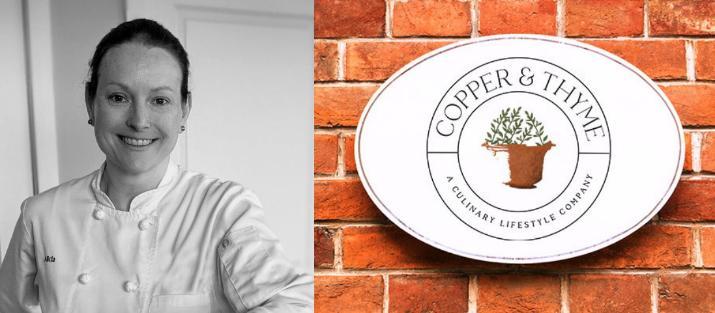
Alicia Charolle '02 of Copper and Thyme
After switching career paths in 2019, Alicia Charolle '02 found her calling in cooking and has discovered the world of personal cheffing. Hear the reason why Alicia switched careers, her funniest childhood memory, and if she thinks pineapple deserves to be on pizza.
When you left the financial services world in 2019, why did you choose to attend culinary school? Was this a dream of yours when younger?
AC: I have always been interested in food and really found my interest in cooking once I graduated from Babson. I wasn’t sure what I wanted to do with myself after leaving financial services, so I thought this was the time to pivot and go to culinary school. I didn’t know what I was going to do after culinary school, but I knew I’d figure it out! When I was younger, I thought I wanted to be a restaurant chef at one point but once I realized how demanding it can be I knew that personal cheffing would be the right path for me.
What is your most popular service: personal chef services, cooking classes, or private event requests? Do you have a favorite? Why?
AC: I typically do more of the personal chef services with multiple clients, but I am looking forward to doing more private events and cooking classes. I honestly like them all because I’m doing 100% customized meals for each client regardless of how the food is presented.
What is your connection to North Carolina? Why did you choose to start Copper and Thyme there?
AC: My extended family has lived in Charlotte for many years and my immediate family also ended up there while I was at Babson. I have always thought about moving there but the timing wasn’t right; until now. I knew that my business would be successful in Charlotte like it has been in Boston the last few years.
What dietary tips would you like to share with fellow alumni?
AC: Don’t feel guilty if you want to eat something that may not be the healthiest. Everything in moderation is okay and you don’t have to feel guilty about enjoying what you’re eating!
Do you have a favorite type of food to cook for your clients?
AC: I have 3 favorite cuisines: French, Italian, and Mediterranean/Middle Eastern.
If you could have a lifetime supply of anything, what would it be?
AC: Can I say carbs?
What's your funniest childhood memory?
AC: Whenever we’d go over to my grandma’s house, she would always sneak us treats! She had a jar of Oreos she kept in the kitchen and while she was cooking, she’d call us over pretending she wanted our help with something and instead would give us Oreos! She would make sure there was no dark cookie residue left in our teeth before we left the kitchen so we wouldn’t get caught.
Speed Round “Agree or Disagree...” (food edition)
- Pineapple is an acceptable topping for pizza. Agree
- The best part of a meal is the dessert. Agree
- I do not like to share my food with others. Disagree
- My favorite type of food to order is Chinese. Disagree
- Breakfast is the most important meal of the day. Disagree
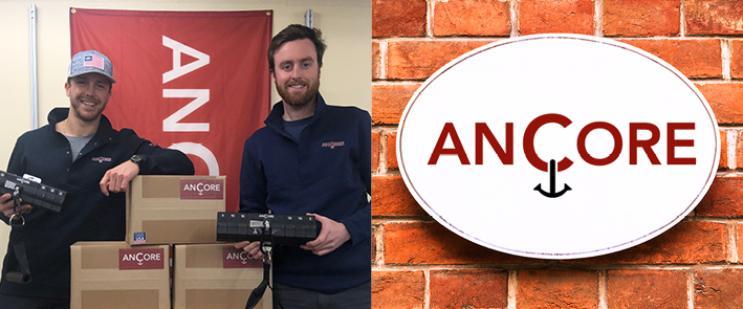
Isaac Lewis MS'19 of ANCORE
What started out as a trip to the hospital for ANCORE founders Isaac Lewis MS'19 and Nathaniel Herring has turned into the creation of number one ranked portable cable machine, which is trusted by numerous professional sport organizations. Read more about ANCORE's keys to success and Isaac's advice for future entrepreneurs.
For those who aren’t sports or work out enthusiasts, can you explain what cable machines are and why they are so valuable for rehabbing sports injuries and general exercises?
IL: A cable machine is a type of exercise equipment that provides easily adjustable levels of resistance that you can push or pull. The resistance from a cable machine places less stress on your joints and can be much safer to use than other weighted options (dumbbells, barbells, etc). Exercises with a cable machine can be performed along any plane (or in any direction) using a variety of attachment pieces. Traditional cable machines are very large and expensive, and are typically only found in commercial gym facilities. ANCORE has improved the accessibility of cable machines by creating a more compact, adaptable and affordable version.
ANCORE was founded in 2019, and today ANCORE is used by the NHL, MLB, NFL, and NBA… what were the keys to ANCORE’s fast success? Any adversities you and the company had to face?
IL: From day one, we focused on product quality and customer service. That meant we responded quickly to customer feedback and implemented design changes in our products to better suit our growing customer base. As well, we built trust with customers early on by providing relentless customer support and placing emphasis on relationships. As with any new company, there have been many adversities we’ve had to face from starting as a bootstrapped company in my co-founder’s (Nathaniel Herring) parent’s garage to setting up our own assembly line. We’re a very scrappy business and a great example of this early on was that we initially tasked our first team member and fellow Babson classmate Mike Carlson ’19 to lead our marketing with a zero-dollar budget.
The long list of professional teams that use ANCORE is extremely impressive, but is ANCORE made for use by the average man or woman who isn’t a professional athlete?
IL: Most definitely, ANCORE’s customer base is extremely diverse and we’ve shipped products to over 60 different countries. We’re proud to have created equipment that is used by the world’s best professional athletes but also used by anyone who wants to train. Although we’ve built our brand around high performing athletes and training facilities, a good portion of our customers purchase our products for their home gyms. Our products are simple and intuitive to use since they require no assembly and are ready to go out of the box. ANCORE can benefit anyone and is involved in a wide variety of training programs. Just a few examples include training programs for group fitness classes, military units, high schoolers, and even paraplegic individuals.
ANCORE designs, engineers, and assembles its products. Does ANCORE provide athletic training showing customers how to use their products? (Exercise videos, programs, and classes)
IL: We have a free online exercise library demonstrating a variety of different movements as well as a handful of workouts you can do with our products. Currently, all of our video resources are free on our YouTube channel. We are expanding our exercise library and debuting more in-depth training program options in the near future. Most excitedly, Rachel Shipulski from our team recently created and piloted an ANCORE group fitness class at a local gym done entirely on our own equipment with great results.
Babson strives to create the entrepreneurs of tomorrow. As an entrepreneur yourself, what advice would you give inspiring Babson students who want to start their own business?
IL: The best advice I can share is what worked for us. We focused on identifying what the most crucial early problems were to get our business off the ground and we worked really hard to solve them. As things progressed, it was vital to learn that problems didn’t go away after achieving any level of growth or success. Instead, the challenges only got bigger. The most important takeaway was that our propensity to deal with those growing problems also grew to keep us just ahead of what we were working through. We used to debate on spending $100 in the early garage days and now we make decisions with significantly more impact to the business with greater confidence. We learned not to underestimate how many small steps over time can get you to where you want to go.
What are three things you cannot live without?
IL: Family and close friends, any form of daily exercise, and my work – pursuing a common goal with others who I enjoy being with.
“Agree or Disagree” speed round:
- Being outdoors is better than being indoors. I love being outside as much as I can.
- Cats make the best pets. Dogs are ahead of cats on my list.
- Scary movies are the superior genre of film. Definitely not near the top of my list.
- Going to a live game beats watching it on a large screen TV. Depends on which sport and where your seats are but Hockey is most likely my favorite sport to watch live.
- Traveling internationally > traveling the States. I grew up outside of the USA but there are so many amazing places both abroad and in the USA. The USA has such a great range of geography within one country but I love experiencing both.
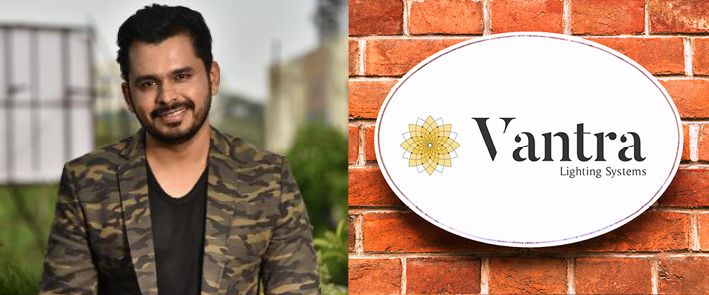
Manish Raichandani MBA'13 of Vantra Lighting
Manish Raichandani MBA'13 and his family have a long history of selling electrical goods – four decades to be exact. The Raichandani family started their journey at Mukesh Electric Center. From there they started Green Surfer and Vantra Lighting, now one of India’s largest decorative lighting brands. Read more about Manish's family origin story and who his mentors are.
What’s the business origin story – how did your family move into this line of work?
MR: My grandfather, the late Pribh Das Raichandani, struggled to take care of his big family of six sons and one daughter. He worked in an electrical store, and after gaining experience and saving some money, he started his own electrical store where he worked alongside his six sons. As the family grew, there was a need to grow the business as the cost of living was increasing. My father, Ramesh Raichandani, started another electrical store in a remote area of Bhopal City back in the late '70s. My father struggled to get customers to enter his store, but he remained patient. Later, his store became the best electrical store in the entire state. When I was younger, I used to visit our electrical store; the place used to be so busy, and I felt it was boring to just be sitting at the shop the entire day selling electric products from companies like Panasonic, Havells, Polycab, and Anchor Electric. After completing my MBA in Babson, we started our own brand of products – Green Surfer and Vantra. It feels amazing to have our products on the shelves of hundreds of electrical stores in India today.
We all know that some people can go “over the top” when decorating their homes, what is the craziest order of lights/home décor you have received?
MR: It was probably back in 2015 when my sales associate got the first project order. It was somewhere around 200 ceiling lights. It was a very small order compared to what we do now, but we had a small team back then yet we were still happy to have received that order.
What is your favorite thing about your career?
MR: Like I said, we used to only sell other companies' goods, but today our products are kept next to those other brands, and we are competing with them in the market. It feels great to have made our brand a household name.
Vantra Lighting has been in the business of electrical goods for more than 4 decades. Do you have any secrets to your success?
MR: Firstly, do everything possible to satisfy your customer. Your customer is always right. Secondly, take good care of your team.
What is one lesson you learned at Babson that you find yourself practicing in your everyday life?
MR: Don’t run after success or money. Run after excellence, and success will follow you.
What’s your favorite tradition or holiday?
MR: Diwali! And you will be happy to know – it’s the festival of lights!
If you could have one superpower for a day, what would it be and what would you do with that power?
MR: This is kind of a tricky one. Perhaps the power to wake up in the morning so I can be in the office on time. This is something I strive to improve.
If you could go back in time, what is one piece of advice you would give to your younger self?
MR: Learn as much as possible from your classmates. There is so much you can learn from others, information that is going to help you in your life.
Do you have a life mentor? Who do you look up to?
MR: My mentors are my dad and my brother. I learn so much from them about business, life, basically everything. Even though my dad and my brother didn't have the opportunity to study for a business degree like I did, their practical life experiences are so great that I would have to say that they have taught me [incredible] lessons.
“Agree or Disagree” speed round:
- "Staying busy all the time is better than spending a lot of time thinking and reflecting."
Disagree, it’s important to keep changing to be able to compete in this competitive world. If you want to be the best, you've got to take some time and reflect on your decisions. - "Rock is the best genre of music."
Disagree, I am not really into music but when I do listen to music, it's only Shahrukh Khan romantic songs (Bollywood). - "Summer is my favorite season of them all."
Agree, I love to travel in the summer. - "A pancake (or two) is the most delicious breakfast food ever."
Disagree, I like Indian food better, but I like pancakes. - "I would rather have happiness than success in my life."
Agree. I believe a person who is happy is already successful.
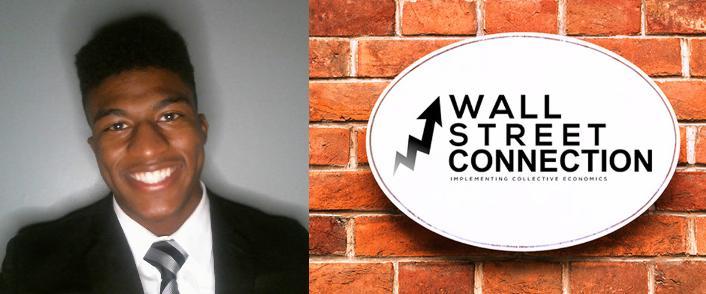
Curtis Johnson '23 of Wall Street Connection
Curtis Johnson '23 is a full-tuition scholarship recipient at Babson College and proudly served as the President of the Babson Black Student Union. He has made it his mission to increase the visibility and attainability of financial services & advisory careers for Black Americans. That is why Curtis co-founded Wall Street Connection in 2022 with Christopher West '18, to decrease the Black-White wealth gap and to eliminate the continued lack of equal and efficient access to financing for the Black community. Hear more about the journey Curtis and Christopher took while starting Wall Street Connection and the challenges they have faced.
Can you tell us how your life experiences shaped your desire to help equip Black youth with the proper knowledge and resources to succeed?
CJ: I started my private equity internship during COVID-19. The current CEO of Chicago Scholars, who helped me get my internship, told me I was probably the only person on the South Side of Chicago with an internship in private equity that summer. He meant to highlight to me how lucky I was to have the opportunity, but I can’t help but think of the people who never hear about these career paths. I come from a low-income single mother household, and the opportunities I have been able to access have made it possible for me support my family during tough times. These careers could change lives.
You and Christopher West are both Babson graduates, but it looks like you weren’t undergraduates at the same time. How did you link up, and how did you decide on Wall Street Connection’s mission?
CJ: Chris and I met through a mutual mentor, Dorien Nunez. Chris started Wall Street Connection as an investment competition in 2021 and worked on it alone until he brought me on. We worked so well together and believed so much in giving back that we decided to make it official and became 501(c)3 approved in October of 2022. Chris really decided on the mission, and I helped shape it along the way. It’s basically rooted in our mutual experience of having finance or Wall Street change the trajectories of our lives. We believe we can do that for youth and simultaneously help close the racial wealth gap given how underrepresented certain populations, especially Black people, are in finance.
You and Christopher West co-founded Wall Street Connection in New Orleans. Do you work directly with Black youth only in Louisiana? If so, do you have any plans to expand to other cities?
CJ: Chris is a native in New Orleans (NO) and the timing between many of the educational reforms in NO, as well as COVID-19, made our entry a no-brainer. The idea is once we’ve really created a solid foundation in New Orleans, we will expand our operations to other major cities with similar people demographics such as Chicago, my hometown, where we would have an existing network to facilitate a launch.
As a recently founded company, what are some of the challenges you have faced so far?
CJ: Our biggest challenges involve the balance of time and material resources. We are currently investing our own money into this nonprofit. We’re also very busy with Chris working full-time and me balancing classes, job recruiting, and now preparing to start full-time as well in investment banking in a few months. While we want to give, we want WSC to exist beyond our personal limitations. For this reason, we’ve been looking into different funding methods as well as potential team members we could bring on to run certain business processes.
What was your proudest moment as president of the Babson Black Student Union?
CJ: I became president right when campus was starting to open back up since COVID-19 and Babson allowed clubs to have events again. I made it my mission to rebuild community, and I almost had an idea in my head that I had to lead every event. My proudest moment was realizing that I was able to let go and trust my team to be leaders. My proudest moments were seeing them grow and build their own initiatives. I strongly believe that a leader’s place is to serve who they lead, and I believe that I was able to do that with my Eboard, as well as my community.
What is one piece of advice you have for the next generation of the Black Student Union?
CJ: Watch the stories you tell yourself. The presidents before me were storytellers and I am more of a numbers guy, but I always admired the power of a good story to bring people together. It was a story of how we could help close the racial wealth gap that brought us the Johnson House [the special interest living space in Canfield Hall named for Black Student Union founder Eric Johnson '72, P'08]. Ask yourself what story you tell yourself and whether or not it serves you. It’s easy to say that you “can’t” or “no one will care” and give up. Shape your own narrative and do the hard thing. Say you can and that you will try because the story you tell yourself will be the story you tell others as well.
Imagine you just won $1 million, what would you buy and why?
CJ: I would invest 40% of it because I want to put enough away for my future family including college for my children if they want to go, as well as getting a head start on retirement. I’d use 20% to hire a program manager to handle the day-to-day operations of WSC and part-time marketing manager to develop our social media presence. I’d use 30% to buy a multifamily unit for my immediate family as housing has been a consistent issue for us. The last 10% I would use to reduce my debt for the MBA I plan to complete or go into a rainy-day fund.
If you were stranded on a desert island, what three items would you want to have with you and why?
CJ:
1. A desert island survival manual so I can scribble Stoic quotes in the margins to stay centered and because I don’t know anything about desert islands except they are hot and surrounded by water.
2. A large mirror to make it easier to self-reflect. It can also be useful as a signal for help, and I can break it to use as an improvised weapon.
3. A picture of my partner to motivate me to get off the island. I’d learn how to fly for her.
And now a “This or That” speed round:
- Board games or video games? Video games, but I blame my partner.
- Adventure or relaxing? Relaxing.
- Saturday or Sunday? No real preference, but let’s say Saturday.
- Early bird or late sleeper? Early bird for sure. Seize the day.
- Salty or sweet? Sweet and salty noodles are amazing.
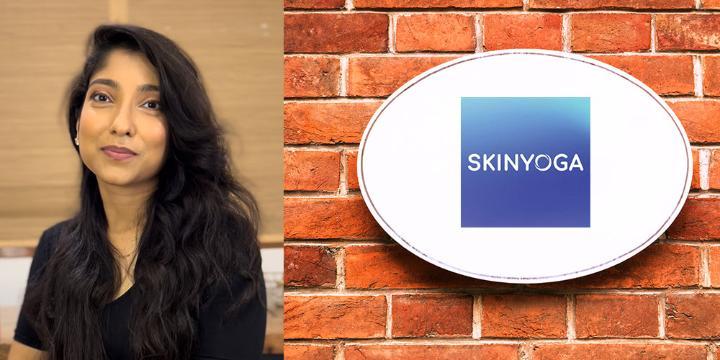
Jagriti Choudhary MBA'13 of Skinyoga
Right after completing her MBA at Babson in 2013, Jagriti Choudhary MBA’13 decided to turn her passion for natural skincare into a business. Jagriti founded her business Skinyoga, which offers skin and hair programs, which solely use natural home ingredients, and promotes product-free skincare. Skinyoga's mission is to provide customers with effective and safe solutions for their skin and hair needs without relying on synthetic chemicals or products. Read more about the inspiration behind Skinyoga and what makes Jagriti’s products unique.
In your Babson Street summary, you talked about how growing up on a farm and living in other continents inspired your journey to creating Skinyoga. Tell us more about how your past experiences led to this venture.
JC: As a young girl growing up on my family's farm in India, I was always fascinated by the natural remedies and skincare practices that my mother and grandmother used. They would make skincare and haircare products from the fruits and herbs grown on our farm, and I was amazed at how effective they were. Later on, I traveled to different parts of the world and saw that many people were using chemicals and synthetic products to take care of their skin and hair. This made me realize the importance of natural ingredients and the potential for a product-free skincare routine. That's how Skinyoga was born - to share the power of simple, natural ingredients with the world.
Skin and hair care products have become a huge and popular industry worldwide, with multiple chain stores selling all kinds of self-care products. What makes your products different from the rest?
JC: What sets Skinyoga apart from other skincare brands is our focus on product-free skincare. We believe that the best skincare comes from harnessing the power of natural ingredients, rather than relying on synthetic products. Our programs are designed to teach women how to create their own skincare and haircare routines using simple, natural ingredients that can be found in their own kitchens. We want to empower women to take control of their skincare and haircare routines and to embrace their natural beauty.
What is the most important tip you would want everyone to know about skin & hair care?
JC: The most important tip for skincare and haircare is to keep it simple and natural. Our skin and hair are delicate and need gentle care, and that's why we believe in using natural ingredients that are gentle and nourishing. Also, it's important to be consistent with your routine and to stay hydrated.
What is your favorite skin or hair care product and why?
JC: My favorite skincare product is actually not a product at all - it's my morning routine of washing my face with cold water and then using aloe vera gel. Aloe vera is amazing for soothing and moisturizing the skin, and it's also great for reducing inflammation and redness.
What are some common mistakes people make that harm their skin and hair?
JC: One common mistake people make is over-washing their skin and hair. Our skin and hair have natural oils that help to keep them healthy and hydrated, and over-washing can strip away these oils and cause dryness and damage. Also, using too many products or using products that contain harsh chemicals can be harmful to the skin and hair.
What are some lessons you learned from Babson that you practice every day in your business, Skinyoga?
JC: One lesson I learned from Babson that I practice every day is the importance of perseverance and working with authenticity. Starting a business is not easy, but with dedication and perseverance, anything is possible. I also learned the importance of listening to my customers and adapting to their needs.
What song best describes your life? Why?
JC: The song that best describes my life is "Imagine" by John Lennon. It's a song about hope and envisioning a better world, and that's what I strive for with Skinyoga - to create a world where natural skincare is the norm and where women feel empowered to take care of their own skin and hair.
Name three things that scare you the most.
JC: Three things that scare me the most are darkness, dogs, and water.
How would you describe a perfect day?
JC: A perfect day for me would be waking up early and doing some exercise and journaling, followed by a delicious buffet breakfast with my family. Then, I would spend the day working on Skinyoga, creating new programs and connecting with customers. In the evening, I would unwind with painting with my daughter and end the day with a cup of chamomile tea.
Speed Round: “Would you rather…”
- Live without TV or without your phone? Without TV
- Be able to travel into the future or into the past? Future
- Live somewhere that is always hot or always cold? Definitely always cold
- Be able to fly or to live under the sea? Fly! I am hydrophobic
- Eat your favorite meal every day for a year or never be able to eat your favorite meal for a year but you can eat everything else? Eat my favorite meal every day for a year!
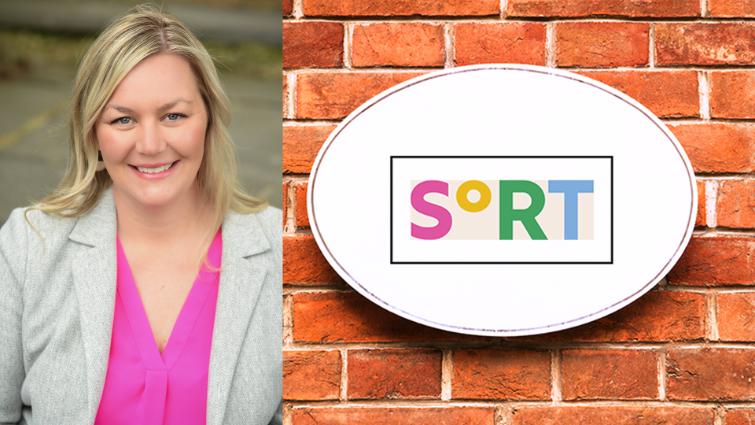
Megan McGovern ’05 of SORT
Megan McGovern '05 always has loved to organize! From a young age, she often could be found color coding her notebooks for school, sorting and organizing the kids' toys while babysitting, and re-arranging her closet. SORT has always been a dream that Megan is delighted to bring to reality. Learn more about Megan's story and don't miss her quick and simple organizational tips.
What started your passion for organization?
MM: Starting at a young age, I was always very organized. As an adult in my professional and personal life, I realized that organization can be a SUPERPOWER for productivity and achieving my goals. Once I realized my strength – I leaned in hard!
Is there a specific service/space you favor over others? (i.e. office spaces, homes/closets, playrooms, etc.)
MM: My favorite projects so far have been arts and crafts rooms/closets. I have completed quite a few of those (including storage closets for a few pre-schools)! There is so much variety and color – and so many fun storage possibilities. My girls are also big crafters, so the materials are very familiar.
Are there any easy and quick organizational tips you want to share with Babson’s alumni?
MM: Organization is a habit. Take some time to reset your space and declutter, and then be intentional about keeping it that way. An example of this would be to ‘put your house to bed’ each night. Start the dishwasher, wipe the counter, fold the blanket on the couch, and put the dirty clothes in the laundry room. If you spend 10 minutes doing these tasks each night, you will wake up and be ready to start the day (without the burden of yesterday's chaos.)
What are some common mistakes or problems you see on the regular when organizing a person’s space?
MM: Most commonly people have too much stuff for their space. When people overstuff a space it becomes very difficult to maintain. Decluttering is a big part of the organization process. I have seen my clients gain so much freedom and energy when they are able to let go.
Biggest accomplishment? (doesn’t have to be about organization)
MM: I am most proud of starting SORT by Megan. I have always had this idea in my back pocket but was intimidated by the process of starting a business. I kept my focus small and took one step at a time. Before I knew it, I had a few clients under my belt and I just celebrated one full year in business!
When you are not organizing things, what are some of your favorite things to do? Any hobbies?
MM: My book club is near and dear to my heart – we are currently reading Demon Copperhead by Barbara Kingsolver and it is excellent. Also, as a family we love to ski. We just got our 5-year-old to go on blues and it's been a very fun season.
What’s your favorite memory at Babson?
MM: Trim dining hall. I loved the community that formed around breakfast, lunch, and dinner… and nothing beat Sunday brunch!
If you could be teleported anywhere, where would you go first and why?
MM: New Zealand is high on my list. Also, I really want to take my family on a road trip west to see the Grand Canyon.
Best advice you heard growing up?
MM: My dad always had some great words of wisdom. One of my favorites is: You miss 100% of the chances you don’t take.
And now a “This or That” speed round:
- Reading a book or watching a TV show? Book
- Dress up or casual and comfy? Comfy
- Appetizer or dessert? Dessert
- Early bird or night owl? Early bird
- Aisle or window? Window
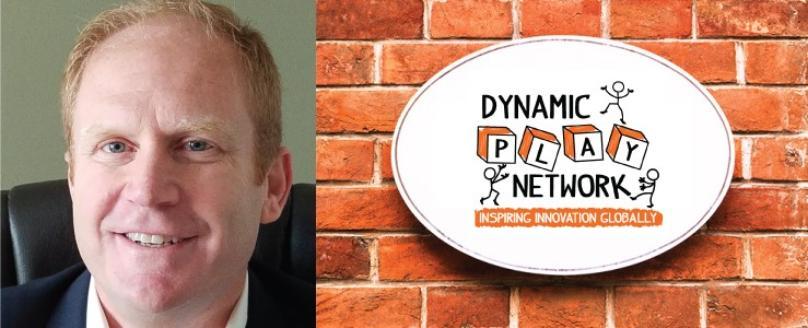
Mark Nathan MBA’88 of Dynamic Play Network
Mark Nathan MBA'88 has a gift for negotiation. From the toy industry to sports licensing focused in motor sports, Nathan has used his talent and skills to transform and grow businesses. After selling his own toy company in 2018, Nathan founded Dynamic Play Network which helps brands and organizations with everything from inception to product development to global sales. Learn more about Mark's negotiation advice, his lessons from Babson, and if he prefers books or podcast.
When growing a business you lend you expertise in several different areas of operation. In which of these areas do you find businesses often need the most help?
MN: The lack of Negotiating skills is probably the area most in need of help in the majority of businesses, no matter what the field. Most companies do not realize that negotiating is the most undervalued and overlooked skill they need. I have turned companies 180 degrees by either teaching pertinent staff how to negotiate with their vendors, or by having them engage me to negotiate directly with their factories. For instance, the Sales area is the heart of a growing company and highly in need of employees’ excellent negotiation skills. In order for an organization to reach its full potential, the sales team must understand the nuances of selling and negotiating, which includes reading the buyers’ body language (difficult in this video conference era) and listening carefully to their “real” concerns and needs. The salespeople are a company’s eyes and ears on the ground. They must be able to instantaneously bob-and-weave during the sales process, taking prompts from the buyers’ visual and verbal cues and negotiating each step of the way.
What advice can you give to somebody who wants to be a better negotiator?
MN: Listen, listen, watch. While most negotiators have a predetermined end-game, the expected conclusion rarely occurs. So listen, and watch how your “opponent” moves their body, rolls their eyes or reacts with words or just noises. Truly capture and digest every detail that comes from the other side of the table. Then, and only then will you obtain the true power to direct the conversation along the path that leads to your goal.
What was the biggest lesson you learned during your time at Babson?
MN: Teamwork. No one person excels at everything. Empower your team and let those who are more knowledgeable about a particular task to run with it. A strong team leader realizes that others in the organization may be more knowledgeable about a particular subject than he or she, usually because these team members are either more educated on the subject or are more involved in that issue. Good team leaders cannot micromanage or they will sink.
People say success is attributed to both hard work and luck. Did luck contribute to any of your business success?
MN: Despite the fact that this may sound biased, no one works harder than I. The companies with which I have been associated will tell you I am non-stop. My mindset is “if you do not try, you cannot succeed.” Just as the lotto adds warn, “You can’t win if you don’t play.” Luck is normally a part of any success to some degree. I also consult for entrepreneurs and start-ups, and I consider it “luck’ that they bring me products which we can build companies. Obviously many products never see the light of day, but the ones in which we truly believe and build upon, the “lucky” ones, will be successful. And “lucky” for my company that we were given the opportunity.
Do you have a favorite quote?
MN: "Take Risks, Fail Fast"
And now a "This or That" speed round:
- Beach or Ski vacation? Beach
- Laptop or Tablet? Laptop
- Mornings or Nights? Mornings
- Books or Podcasts? Books
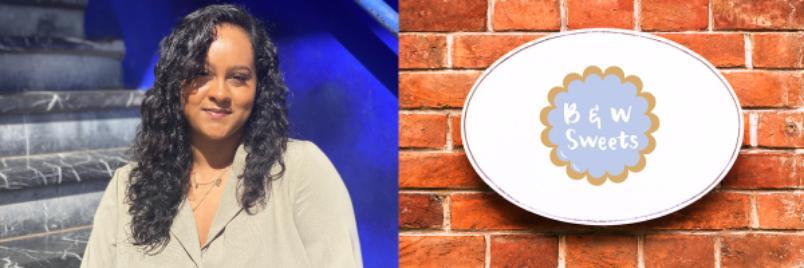
Brianna Wong ’16 of B&W Sweets
Media Analyst by day, baker by night (and day too sometimes). With a full time career already, Brianna Wong '16 decided to also pursue her passion for baking, opening B&W Sweets in 2019. Wong talks keeping up with bakery trends, surviving the pandemic, building a business from scratch, and what truly is the best kind of frosting.
What has been your favorite creation so far?
BW: This is a tough one, I love all of my creations! If I really had to choose, I'd say my cakesicles. It's really tough to get a perfect balance of chocolate and cake and I truly think I've mastered it. Plus, they're super cute and customizable. You can have a lot of fun when decorating them.
How do you keep up with the bakery trends or fads, such as the hot chocolate bomb this year?
BW: This takes a lot of research and time – I spend hours browsing through Instagram, TikTok, and Facebook to see what's up and coming. It also takes a lot of planning and innovation - finding out where I can get supplies fast enough so that I can still be a part of the trend is a big one. I'm a quick learner so once I master whatever is trending, I then spend time trying to differentiate myself and make it my own – that's the hard part. All in all, I keep up my dedicating time specifically to research and test things out.
What was the most challenging aspect of building a business by yourself?
BW: Education and accountability, hands down. There is so much to do and so much to learn and you have to do it all by yourself. There are no employees, no one to hand things off to even when you're tired from your full time career. There are a lot of resources out there for you to learn business best practices, but it does take a lot of time and dedication to learn and put these tactics to use. Also, when things go wrong, you have to figure out how to bounce back and think about how every decision could potentially impact the future of your business.
The food service industry has struggled in the last year. As a baker, did you find yourself experiencing the same drop in business? If so, what changes did you make to encourage orders?
BW: This was a weird time for me honestly. My business was just beginning to take off as the pandemic hit, so I wasn't really sure how to gauge my success; however, I did see the impact on other companies and felt that I needed to work harder to make sure I didn't fall apart. One of my first initiatives was marketing 'Care Packages' that consisted of 6 cookies and a handmade card, which was perfect for loved ones you couldn't see due to COVID. As time progressed, I began working with classmates and their employers to develop team bonding cookie kits – so the team would order custom cookie kits inclusive of icing, 'naked' cookies, and sprinkles and they'd decorate them together via Zoom.
Let’s end the debate – what’s the best type of frosting?
BW: Personally, I'm a fan of whipped cream frosting. Its tough to get the perfect texture, but so worth it.
And now a "This or That" speed round:
- Tablet or laptop? Tablet
- Blue or red? Blue
- Breakfast or dinner? Dinner
- Cupcakes or cookies? Cupcakes
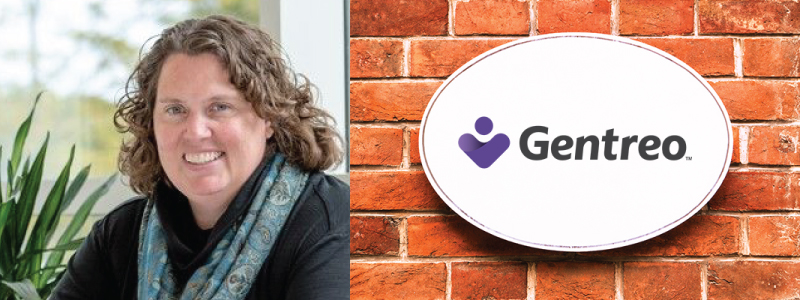
Renee Fry WIN Lab ’19 of Gentreo
Inspired by her father's diagnosis with Alzheimer's disease, Renee Fry set out on a quest to create an easier way for people to create and share health and estate plans. Read to learn more about Gentreo's unique position in the market and why you should think about estate planning no matter your age.
What first sparked the idea to create an easier way for families to create and share health and estate plans?
RF: Our father has Alzheimer’s disease. It is just as bad as all that you have heard about it. Our mother, at 70, struggled to learn whole new skillsets to try to plan legally and financially for herself and my father. She is not alone though. In the US today, there are over 40 million Americans who are over sixty-five and these families have over 60 million children who are helping care for them as they age. Our research showed that many families are just like our own, they know they need to do planning – like estate planning and figuring out how to pay for care, but often don’t know where to start or find getting help is too expensive. That is why we created Gentreo.
What’s the most rewarding story you’ve heard from a client?
RF: We have heard from several people who were so happy with the documents and the website, that they contacted us about giving subscriptions to friends and family. One woman in Iowa stood out because she is caring for her aging parents and was particularly stressed about ensuring that their financial future. She lives in IA and her parents are in FL. With Gentreo, it was easy to complete all the documents her parents needed and now she always has access to them with just a few clicks!
Many people put off writing their will because it’s an uncomfortable topic. How do you make this an approachable conversation to have?
RF: Thinking and talking about your future in this way may not be everyone’s favorite topic but we emphasize that the conversation is really about choices and ensuring that what your wishes are followed whether it’s about your house, money, pets, or favorite possessions. You will want to make sure that you make the decisions and not a court. One suggestion to make this conversation more comfortable is to begin talking about politics, then any other topic may be welcome. Jokes aside, doing estate planning when you are healthy is much easier than waiting for emergencies to happen as they will, and not being prepared costs families thousands of dollars, lost time and lost choices.
Why should people start thinking about planned giving at younger ages?
RF: Estate planning is for everyone over eighteen years of age as it protects health care decisions, assets and choices. We do a lot with life inflection points. For instance, if you are getting married you might want to name your spouse as your health care agent instead of your parents. Or, if you just had a baby, you want to make sure to add your child to your will and name guardians too. In other cases, it is particularly important for those needing care so they decide who can make critical health care and financial decisions for them. COVID has taught us that this can be any age.
Unfortunately, estate planning today is completed by only about one-third of Americans, and the number of protected Americans is dropping significantly—reflecting a 25% decrease in just three years. Estate planning attorneys exist to prepare documents, such as a will or health care proxy, yet these services cost thousands of dollars and are hard to access, especially during the Covid-19 pandemic. Even if documents are created, these are often lost or misplaced. This lack of planning leaves families, especially caregivers, with unexpected expenses, large losses of time and great angst.
Even though decision-makers and caregivers, especially those caring for loved ones with Alzheimer’s disease (AD) and AD-related dementia (ADRD) (also known as People with Dementia), are often motivated to help family members, they usually have no resources to turn to and face major barriers in completing estate planning and using on-going support tools to help make their lives easier and more affordable
Is there an unconventional question you ask when interviewing potential employees? Or what quality do you look for most when hiring somebody?
RF: Do you have Wi-Fi and a dining room table? How do you do working remotely? We've grown quite a bit and have employees from around the United States. Making sure everyone has a good place to work is a critical component of making sure that person is setting themselves up to be successful. We have a great office at Qubic in Quincy, MA for those who are local, but many of us—due to COVID concerns—work from home.
What is one small thing that can make any day better for you?
RF: Finding a bargain. Even though I don’t own a cat, I once bought cat food for an animal shelter because the price was too good to not take advantage of a great deal. The shelter was very happy! We have sent lots of taco seasoning to our troops abroad as well (in addition to other gifts).
Who was your biggest supporter when you were creating Gentreo?
RF: I want to give the Babson WIN program a huge shoutout. Throughout the 6-month WIN program we learned how to raise capital as female founders, develop strategic partnerships, and that the bottom line matters. As finalists in the Babson College Women Innovating Now Contest of 2019, sponsored by the WIN Lab, we attracted the attention of our first seed investor and have taken off from there.
Did you have a New Year’s resolution for 2021?
RF: My resolution is to make others make getting their estate planning done their resolution! Plus, I am walking at least five times a week with our dog Butter. Butter loves having us home lots more and is good at reminding me it is time for our walk.
And now a "This or That" speed round:
- Music or podcasts? 1980’s Music
- Paper book or eBook? E-book, but I typically don't read books, mostly articles and news.
- Relaxing or productive weekend? Productive—like fixing my front stairs.
- Road trip or flying? Road Trip! I've been to 44 states in the U.S. so just a few more to check off in the south and west.
- Sunrise or sunset? Sunset
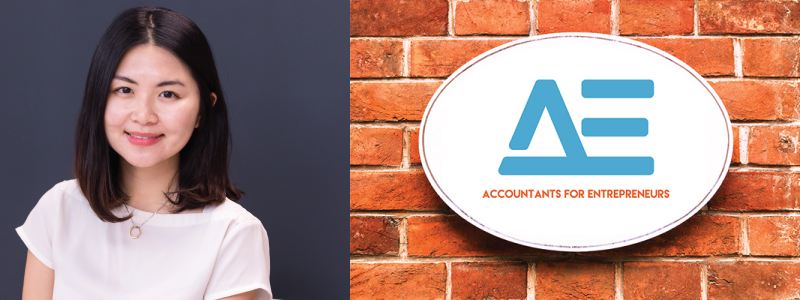
Sara Wu ’09, MS’09 of Accountrepreneur
Inspired by her mother, Sara Wu discovered a passion for accounting. After working for a Big Four firm, Wu eventually started her own company that helps entrepreneurs and small businesses get started. Read why she finds accounting interesting (even fun!), why trust is so important in this field, and how she's tapped into the Babson alumni network to build professional and personal relationships.
Your business focuses on serving entrepreneurs and small businesses? Why is this service so important to them?
SW: For every stage of the business, an entrepreneur or small business needs to have a trusted CPA to help them along the way. Our firm gives them the upper hand in the early stages of businesses, helping them set up the right tax structure from the beginning so they are not overpaying for taxes later on, maximizing various tax benefits and deductions every year, and ensuring they have a perfectly organized and well-managed bookkeeping system. This allows them to assess the financial health of their business as well as gain deep insights into the business to make better and profitable decisions.
When did you discover your passion for accounting?
SW: My mom is also an accountant. Hearing her talk about stories on how accounting is used to improve the bottom line of businesses, to detect fraud, and uncover embezzlement within a company was very fascinating to me. I started taking accounting classes when I was a junior in high school. I love math and business, so accounting is an intriguing subject to me. I like that accounting is very practical and useful for every business. By understanding numbers and facts, businesses can use the information to guide their decisions and business strategy.
When it comes to marketing your business, what have you found to be most successful?
SW: Because Accounting and Tax advisory are such personal matters, our business relies on trust and personalized relationships. We found that attending networking events, connecting with small business owners, and really listening and providing good advice from the get-go is what helps us to gain the trust and confidence of our potential clients. The other is constantly providing quality services and care to our existing customers so that they become our biggest advocates and referrals.
Let’s be honest, only accountants think accounting is fun. In one paragraph, make it interesting for the rest of us.
SW: Oh, this'll be fun! I found that having an accounting mindset really helps you to understand how money works and flows in a company, and ultimately, how a business operates. Whether you are an investor or an entrepreneur you need to understand how to read financial statements. You can learn a lot about a business' profitability, their cash positions, their liquidity, and even their strategies by reading their financials. For example, I was evaluating a business investment opportunity and quickly spotted that they might have future cash flow issues despite the fact that their profit and loss statement shows a net profit. Because I understood how to read their financials, I was able to avoid a costly investment that could have impacted my financial position.
Ok, we’re semi convinced! So what’s the most valuable thing you learned at Babson?
SW: Building relationships and networks are key to business success. I learned when I was still a Babson undergraduate that there is a network of successful Babson alumni around the world that I can connect with and learn from. I connected with an alum when I was searching for an internship at a Big Four accounting firm. Through her I was able to learn about the ins and outs of the firm, she introduced me to her partner, and she was my first unofficial mentor at PwC.
Then when I started my accounting firm, I was able to connect with alumni who helped to push my contacts to their clients. Last year after connecting with an alum, a start-up founder from his network reached out and became my client.
I am very thankful for all the connections and friendships that I have made over the years because of the powerful Babson network. So go out and connect with your Babson network, you never know the kinds of opportunities that may come your way and the people will meet.
What is the most important trait you look for in an employee?
SW: Curiosity and the willingness to learn and to improve. During my accounting career, I often found that the most successful employees are the ones that are always asking good questions, who are innovative, and are constantly improving and thinking of better, creative, and efficient ways to do things. We want employees that can think on their own and are curious to learn. Our firm uses technology and automation to minimize the mundane administrative tasks for our staff so that they can have the capacity to do more high level and interesting work. We always look for feedback and technology suggestions from our staff. So we appreciate employees who are adaptive to technology and changes.
What book are you currently reading?
SW: Delivering Happiness by Tony Hsieh. After hearing of his tragic passing last year, I was curious to learn more about his story. I have always heard and read case studies about the Zappos employee culture, so I wanted to learn more about their story from Tony's perspective. As an Asian American and an introvert in the business world, I drew inspiration from his work, his acts of kindness, and charitable work to his community.
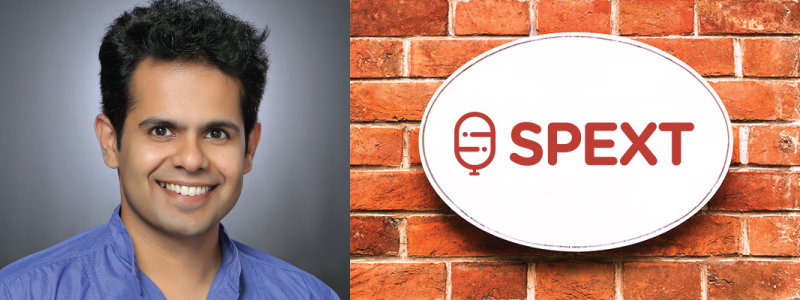
Anup Gosavi MBA’13 of Spext
Wanting to create a podcast, but frustrated by the audio editing software that was available, Anup Gosavi MBA’13 set out to build an easier platform. Spext was born, making voice media creation easy and accessible. Read how this technology has exploded over the past few years, what Gosavi's favorite podcasts are, and a few tips for aspiring entrepreneurs.
Did you have your own podcast when you first thought of making audio editing easier?
AG: I did not but I wanted to create a podcast for the startup I was working on – as a content marketing channel in addition to blogs and video. But to edit the podcast, you had to learn waveform based software which had a high learning curve. I tried learning but it took too much time and I just didn’t have the bandwidth – that meant I never started a podcast but found an opportunity. If somehow you could make audio editing easy, it could allow millions of people tell stories in their own voice.
Why are podcasts so popular?
AG: There are a few trends that made podcasts popular:
- Awareness of screen fatigue – we are staring at our devices all day and are becoming aware of the fatigue it causes. So, we are actively trying to monitor our screen time and actively reduce it. Podcasts are a great alternative to spending time looking at screens
- Need for nuance – Social media is all about short bites – 280 characters, 1min TikToks or 5min YouTube videos. As nuance is becoming rare, we are craving it as society and podcasts is a great channel. You can have hour long conversations and go deep on any subject. You hear the person’s voice, their tone etc. which feels intimate, generates a lot of empathy and is a type of conversation that is not seen elsewhere.
- Alexa and other voice only interfaces – these interfaces are very easy to use and are in millions of homes now. This reduced the barrier to access podcasts
Has there been an increase in Spext users with more people working from home?
AG: Very much so! The number of recorded audio/ video conversations has grown 100x in the last 3 years, with most of the growth coming in 2020. People are recording all types of content and want to edit, share and clip the best bits.
Do you have advice for our recent graduates looking to break into the field of technology?
AG: Unlike other sectors, tech is very open and has an inherent culture of paying it forward. So, you can cold email a founder, investor or manager and there are high chances that they will reply to you. So, my advice would be to have a clear ask/ request and just send it out to people in tech you want to meet. Make it personal, crisp and clear and people will open doors for you. That is how I got into tech. So, just send that email!
What was the most influential class you took at Babson?
AG: Mergers and acquisitions was a great class as it set the base for evaluating opportunities/ companies. Valuing a company has a lot of assumptions and is as much art as science. You can assign a probability of success to each assumption and then, evaluate the opportunity holistically. This probabilistic mindset has helped me in making decisions, taking bets on innovative projects inside the company and broader investing.
What are your favorite podcasts and why?
AG: Two come to mind: First is a fictional audio drama called Dust. It’s about an AI that avenges the extinction of the human race caused by an alien race. The script, voice performances and depth of the story was incredible. It was like a Marvel movie made for the ears. Second, The Portal podcast by Eric Weinstein. Eric is a first principles thinker and invites guests who have unique insights about the world we live in – from politics, physics and art. The unique perspectives of guests are incredible and you learn to look at the world differently.
What habit or activity would you recommend to aspiring entrepreneurs?
AG: Getting enough sleep! It helps you stay positive, make better decisions and remain energetic for the long haul.
Are you most productive in the morning or night?
AG: Morning person – I like to get up early and feel I am most productive between 8–11 a.m. when I get quiet time to work on my tasks before the meetings start.
Do you live to work, or work to live?
AG: Live to work would be honest but I think like all entrepreneurs, I am all about work-life harmony. You will never have a balance in the traditional sense – you can’t just switch off work at 5 p.m. But if you deeply enjoy what you do, it doesn’t feel like work.
Worst job you ever had?
AG: Don’t think I have ever had a bad one to be honest and I am very thankful for this.
Something on your bucket list you haven’t done yet.
AG: Visiting Europe! Have never been. Hopefully in 2021.
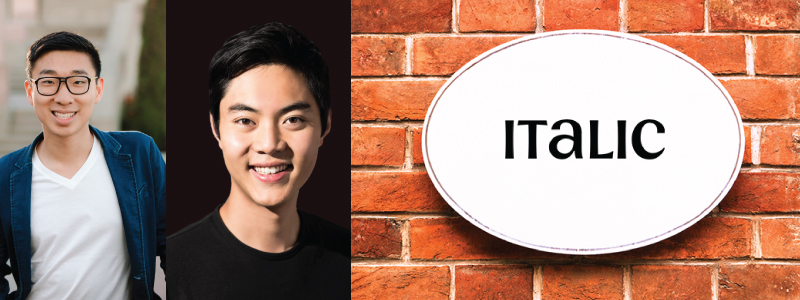
Jeremy Cai ND’17 and Derek Tu’18 of Italic
In 2018 Jeremy Cai ND’17 and Derek Tu ‘18 launched Italic—a virtual marketplace where members can purchase luxury products from some of the world’s best known brands (think Prada, Gucci and Louis Vuitton) directly from the manufacturers—minus the label. According to Cai, Founder and CEO, and Tu, Product Manager, Growth, it’s an entirely new category of shopping, one where consumers prefer quality over the label. They knew they were on to something when they had to waitlist people to get in.
What is the most exciting part of running such a unique business?
DT: No two days are the same and I'm constantly feeling pushed and challenged.
How did you know when you had the right idea?
JC: After we launched the Italic membership, we began to see members placing orders 4x more frequently as before and customer lifetime value increase by 50%. Between the numbers and the demand for membership, especially when we had a waitlist in place, we knew were on to something.
How do you handle adversity or doubt?
DT: I rely on my faith, knowing that the man above wouldn't give a challenge I can't handle.
Do you see Italic staying a unique shopping experience, or do you think more companies will follow your trend of direct to consumer shopping?
JC: We've already seen more and more companies adopting the "direct from manufacturers" verbiage and raising funding under similar premises to us. We're able to offer an incredible value proposition for consumers by innovating on the supply chain, and the industry is taking notice.
What types of products sell best on your website?
DT: Since the start of the COVID-19 pandemic, we've seen sales of products in the Home and Kitchen categories skyrocket. Makes sense, with everyone staying put and looking to upgrade their living spaces.
How do you define success as an entrepreneur?
DT: Taking a quote from my brother – "A successful entrepreneur is someone delusional enough to think the world can change and narcissistic enough to think I can be the one to change it."
What are 3 characteristics you look for when hiring someone?
DT: Loyalty, self-awareness, humility
Describe yourself in three words.
DT: Always ask why
What is your dream vacation?
DT: My wife and I would love to make it to the Maldives, before we completely lose them to climate change.
Do you prefer coffee or tea?
DT: Tea in the morning, coffee in the afternoon!
What celebrity or athlete would you most like to meet and why?
JC: Blake Lively. I'm a huge Gossip Girl fan.
What is your favorite memory at Babson?
DT: There's not a singular memory that stands out, but I miss the late nights in eTower jamming on ideas and talking about our dreams.
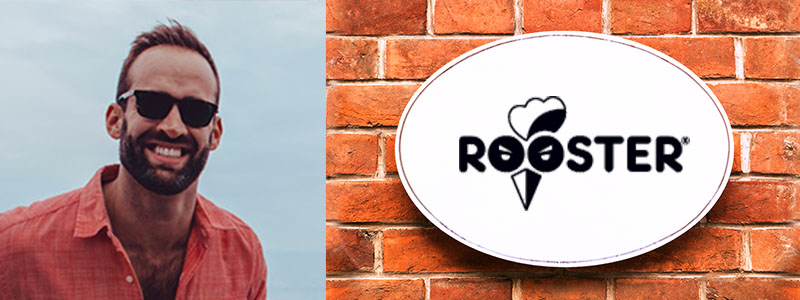
Hans Homberger MBA’14 of Rooster Natural Booster
Hans Homberger MBA’14 founded Rooster Coffee Booster with his brother Paul in Costa Rica. They wanted to create a natural and coffee-based energy drink. With no sugar, no gluten and no lactose, the 15-calorie drink can now be purchased in the U.S.
Where are your energy drinks currently sold?
HH: Throughout Costa Rica and in the USA through Amazon.
Which flavor is your personal favorite?
HH: Grape (this one also has 10mg of CBD) and Watermelon.
How do you differentiate your brand from other energy drinks on the market?
HH: Rooster is the only natural energy drink made out of coffee caffeine, has zero calories, and doesn’t make you “crash” afterwards.
What type of day makes you most need an energy drink?
HH: Any day that I work out! I take it 15 minutes prior to working out and gives me a 4-hour energy boost. It’s also great for studying/working since it improves your mental performance.
Was something more difficult about owning your own business than you expected?
HH: Definitely! The amount of times we had to iterate to make Rooster a great product were far more than we expected!
What is the most valuable thing you learned at Babson? How have you used it?
HH: Fail fast, fail smart. Rather than planning too much we do small and quick tests to verify what the market says about our products and modify accordingly.
The best advice you ever received?
HH: Define what your purpose in life is and go for it, no matter what!
What’s something you can’t live without?
HH: Coffee and caffeine! And tons of them!
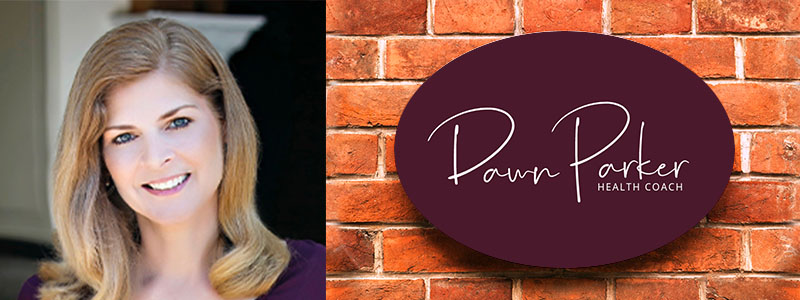
Dawn Jasie Parker ’92 of Dawn Parker Health Coach LLC
Dawn Parker ’92, helps people lead a healthy lifestyle. After months of quarantine, she offers tips on how to get back (or stay) on track, explains why diets aren’t always one-size-fits-all, and assures us that we can still satisfy our sweet tooth.
How do you feel about the various mainstream diets right now?
DP: As a functional medicine health coach I believe that no one diet is right for everyone. There are some excellent philosophies behind the Paleo diet, the Keto diet, the Ketotarian diet, and some others. But in the end, I often see clients in my practice that have tried them all and still don’t feel well. I think these diets will be around for a while, and new ones will come as people are always trying to find that one, perfect diet. Things to look for in any diet are an emphasis on less sugar, less processed food in general and more nutrients (vegetables, clean proteins, healthy fats, etc.). What any one diet cannot do is account for individual nutrient needs, food intolerances, genetic differences, underlying health conditions and tastes. Having a coach with strong knowledge in nutrition and functional medicine can help you find the way of eating that works best for your unique body.
In your cookbook, The Healthy Chocoholic, you show people they can eat healthy and satisfy their sweet tooth at the same time. We’re all ears.
DP: There are a lot of chocolate lovers out there, but also a lot of people that want to be healthier. Why should we have to choose? Cacao is one of the highest antioxidant foods in the world and has been shown in clinical studies to have multiple health benefits. It’s what food manufacturers add to the cacao that make many chocolate treats unhealthy. In The Healthy Chocoholic cookbook, cacao is combined with other healthy ingredients like nuts, seeds and coconut to create healthy sweet treats. And to be lower glycemic and less processed, white sugar is swapped out for more natural sweeteners like dates, coconut sugar and maple syrup. Since food intolerances are on the rise, top allergens like gluten, dairy, soy, corn and peanuts are excluded, and many of the recipes are perfect for those following a paleo or vegan eating style. There’s something for every chocolate lover.
Do you have a favorite “cheat meal” or guilty pleasure?
DP: As the title of my cookbook might tell you, my favorite guilty pleasure is dark chocolate. I particularly like salted dark chocolate and dark chocolate covered almonds.
What is the most satisfying part of coaching somebody?
DP: As part of my initial work with a new client, I have them fill out a health history form and a symptom questionnaire. I typically meet with clients every two weeks and it’s very satisfying to hear about client progress at each session. But the part that always blows me away is when they fill out their symptom questionnaire again at the three-month mark. It’s not uncommon to see 70-90% reduction in symptoms in just three months. To be able to review that together and celebrate with them just how far they’ve come so fast is a rewarding feeling. The power of nutrition and the body’s ability to heal itself never ceases to amaze me. And to help people get their energy back and feel good in their body again is an amazing gift.
Some people may have developed unhealthy habits after being stuck inside for the past several months. What are some tips you have for staying healthy right now?
DP: Yes, this is so true! I have had a big surge in new clients over the last couple of months. One thing this whole epidemic has highlighted is the importance of preventing and addressing chronic health conditions. Some general tips that will serve most people well are:
- Get outside a bit each day, especially in the morning. It’s no fun being cooped up inside. If it’s a nice day, taking a walk in the morning sunshine or even just enjoying your morning beverage outside is good for mood and for the circadian rhythm (think better sleep). My personal favorite ways to get some sunshine are playing tennis with friends a few days a week and doing at least one video call a day out on my back patio.
- Stay hydrated, and get real with yourself about your choice of beverages. Are you getting enough clean, filtered water? Or are you going from coffee to soda to wine? If you need coffee in the morning to wake you up, soda in the afternoon to help with the 3 pm energy crash, and alcohol in the evening to relax, perhaps it’s time to make a shift. Don’t get me wrong, there’s nothing wrong with coffee or wine (and in fact there are really great healthy options on the market for both), it’s about balance.
- Get moving with frequent breaks. With more people working from home than ever, it’s easy to just sit at the desk all day on video calls and doing work on the computer. This sedentary lifestyle is very bad for our health. And can also result in back and neck issues from being hunched over for hours at a time. A couple tips are to take a walk during phone calls, or make yourself a standing desk for part of the day, or just simply set a timer to remind yourself to get up every 20 minutes (do some squats, refill your beverage, etc.).
- And of course, eat less sugar and more vegetables. How could I not say that?
Where is your favorite place?
DP: My favorite place—other than my home—is Canyon Ranch in Lenox, Massachusetts. I’ve been 10 times! I get to enjoy healthy gourmet food, massages and body treatments, take fitness classes, and best of all, it’s a weekend away from it all to de-stress and have fun with girlfriends. I always come back home so rejuvenated.
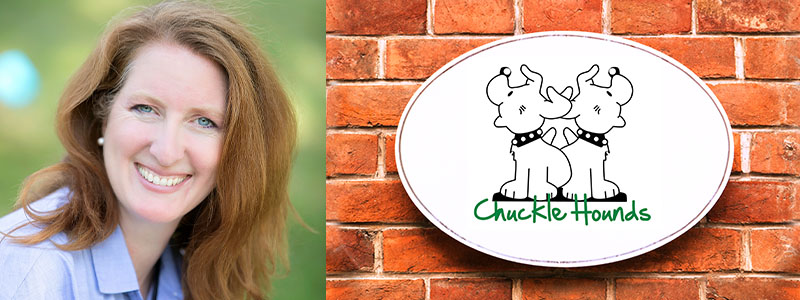
Sarah Dyer ’95, MBA’07 of Chuckle Hounds
Dogs! Now that we have your attention, read how Babson Street shopkeeper and Babson alum Sarah Dyer ’95, MBA’07 found work/life balance—even when she’s working 14 hour days, and how her business selling fun bow ties, collars and other accessories for dogs (and goats and pigs) is a labor of love.
Why dogs?
SD: Because dogs are awesome. I started the business when I was living in Montreal and had just adopted a new puppy. There weren’t any fun options for collars, leashes, etc. for him. I was bored, and a friend owned a dog boutique in Boston so I made a few bow ties for her to sell, and brought a few to a shop down the street from my apartment and it just took off from there.
What do you enjoy most about running your business?
SD: The dogs of course! We get to meet all kinds and people love sending us photos of their dogs in our bow ties and accessories. That’s pretty great. It’s hard to have a bad day at work when you make bow ties for dogs. My dogs can come to work with me every day. Plus, the flexibility is nice. I joke that I work 14 hours a day, but I get to pick which 14 hours. I’m fortunate to live by the ocean in Maine, and it’s amazing to be able to have lunch on the dock, or take the dogs swimming when the tide’s in. That quality of life element is so important.
Do people often send you pictures of their dogs wearing your creations? What’s your personal favorite?
SD: They DO! And I love it. It makes my day to see how happy our products make people and when they take the time to take a nice photograph and send it to us, it means a lot. Hmmmm…my personal favorite changes every time I get a new photo. But we’ve had some really unique ones—a pair of miniature pigs in Jacksonville, and last week I had a picture of a goat in North Carolina dressed up and looking pretty dapper. Weddings are good too. I love when people include their pups in their special day.
You recently expanded your business to include face coverings. Was this an easy pivot from dog collars and accessories?
SD: Surprisingly, it WAS easy! We have a full storage area of fabric in our studios, and when our main revenue shut off with the closing of our retail clients (dog groomers, pet boutiques, etc.) we started getting requests from local clinics, care facilities and even our local grocery store for masks. So many of us felt helpless and just wanted to feel useful. I teamed up with my mom, and some friends and neighbors who were also looking for ways to help, and we just started cranking them out as the requests were pouring in. From there, we added some to the website for a few clients who were still open (vet clinics, etc) and it really took off. Now, we’ve expanded to have “mask mates” where we match the human face mask to a bow tie for their canine companion, and it’s been really well received. It’s a fun way to make the best of the crazy situation we’re in. I also think it helps kids get on board with wearing their own mask when their dog has a matching accessory.
What type of dog(s) do you have?
SD: We have an 8-year-old black lab named Magnus (who was the inspiration for the company) and a 5-year-old Catahoula/Lab mix named Jake who was rescued from Texas.
Tell us about how you help animal shelters?
SD: Any way we can. It’s an important part of our mission to be a contributing community member. For us, that translates to volunteering at shelters, fostering puppies (yeah, pretty great) and running fundraisers to help raise money for critical medical expenses. In addition, we donate hundreds of bow ties to shelters to help with adoption photos and as prizes or giveaways for their own internal fundraising events.
How do you take your coffee?
SD: Who has time for coffee? Kidding, I’m an espresso gal… but it takes me two days to drink a latte…hot day 1, and half into the fridge cold for day two. Strange, but true!
What book are you currently reading?
SD: I’m split between Detective in the Dooryard by Tim Cotton and Vegetables Unleashed by Jose Andrés (I’m obsessed with what’s happening in my gardens this year).
Do you have a message for our newest alumni, the Class of 2020?
SD: The best advice I can give you is to get out and embrace life. Don’t get sucked into work too much. You’re young, flexible and there are so many cool things to do at this stage in your life. Find a company that celebrates your need for personal time and development. I was lucky to be living in Boston when I was younger, and loved using the Community Sailing program in the summer. My job let me off early one day a week so I could go learn to sail. I made some lifelong friends, and have some amazing memories of beautiful sunsets on the Charles River. Find your sunset and summer breezes and make sure you get to enjoy them!
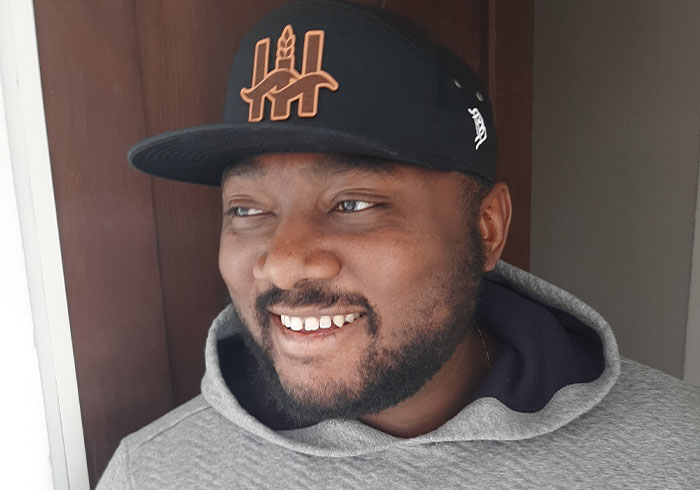
Kamaal Jarrett MBA ’12 of Hillside Harvest
Born in Cypress Hall, Jamaica but raised in Massachusetts, Kamaal Jarrett MBA ’12 founded Hillside Harvest, using delicious gourmet sauces to combine the two cultures that raised him, and combine his passions for food and entrepreneurship. Read everything from how he hopes for real progress during this moment in history, to why his Original Hot Pepper sauce is worth the burn.
What is your favorite part about working in the food industry?
KJ: There are a lot of reasons. Chief among those would have to be the connections that I have been able to make across local communities. I’ve met great folks, from customers to competitors, who have been integral to growth of Hillside Harvest and to my development as a business owner. I also love that my current product line allows me to be a purveyor of happiness and adventure. Hot sauce may be one of the few products where you’re guaranteed to get a smile and possibly a story even when someone is turning down your offer for a tasting.
Which sauce is your favorite and what food do you most like to pair with it?
KJ: Of the sauces that I’ve launched thus far, my favorite is the Original Hot Pepper. I use it as a marinade for grilled chicken and fish, I douse it over pizza, and it’s incredible as a topping for oysters. It’s a little spicier than the other two sauces but the burn is well worth it for the flavor!
If you didn’t run Hillside Harvest, what do you think you’d be doing right now?
KJ: The easy answer is that I would have continued along the path of Product Management that I was on prior to starting Hillside Harvest. I really enjoyed the ownership of the development process and I got to work with really smart and inspiring folks. Though, I like to think that I would have started some other venture had it not been Hillside. I’ve always had a passion for food and an itch for entrepreneurship.
The world has changed dramatically over the past few months. What are you most hopeful for?
KJ: I’m hopeful for actual progress. It’s virtually impossible to improve on issues that aren’t acknowledged. We’re in a historic moment in time when citizens and corporations are having difficult but overdue conversations about systematic inequality, making it hard to ignore. I’m hopeful that we’re finally uniting as a country to confront a broken system and working towards a future where opportunity (or lack-there-of) is no longer correlated to skin pigmentation.
Do you feel it’s important for people to support black-owned businesses?
KJ: I believe it’s important to support black enterprise. However, we tend to put a lot of onus on the Consumer to carry this support. I view them as only part of the equation. I believe that there needs to be more focus put on ensuring that black entrepreneurs have equal access to vehicles of development and growth for their businesses - namely; experienced advisors and access to capital.
What is the most challenging part of what you do? The most rewarding?
KJ: The most challenging part of my job is juggling the constant cycle of strategy, execution, and pivot. There is no better example than the past few months as to why business owners need to be flexible. Those challenges are compounded a bit when you’re a company of one.
The most rewarding part of my job is still the sale. Regardless of the channel, it never gets old. I could be having the absolute worst week ever but getting a few pings of online orders or an email from a prospective wholesale client fills you with so much energy and excitement that it can turn everything around. Aside from the obvious monetary benefit, sales are a great source of encouragement and they provide you with the confidence needed to keep pursuing your goals.
Do you have a show that you’re currently binge watching?
KJ: It’s probably safe to say that we all have had more free time than we would have liked. I’ve been filling some of it by watching an embarrassing amount of “People Just Do Nothing” on Netflix. Ironic title given the circumstances, but ridiculously funny show.
What message or advice do you have for the Class of 2020?
KJ: It’s been a tough year, but use this time as an opportunity for self-reflection. Now, more than ever, the world will be relying on its future leaders to develop opportunities for growth and positive change. Be brazen in your quest for innovative solutions especially in the face of those who tell you things are impossible.
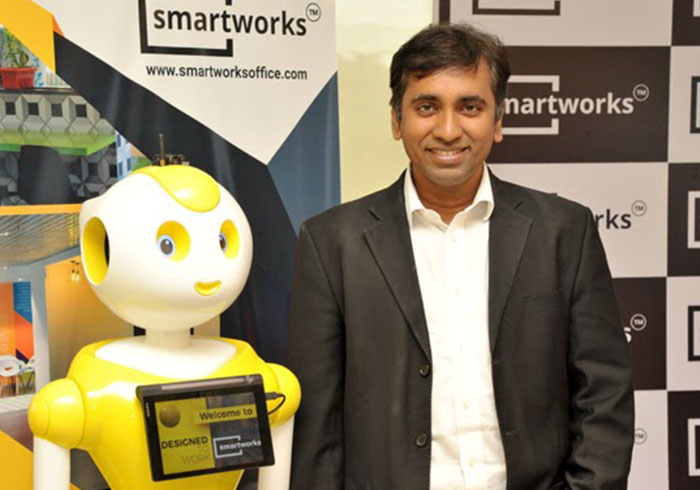
Balaji Viswanathan MBA’14 of Invento Robotics
Viswanathan of Invento Robotics says that “great businesses are born in disastrous conditions.” He managed a critical pivot during the pandemic. His robot, Mitra, initially developed for banks and office receptions for interaction with visitors, is now being used to offer contactless screening of people as they enter buildings.
In what ways do customers use your robots?
BV: Our robot was used in customer engagement in banks and office receptions. These converse with visitors and can do a range of complex applications such as insurance selling through a voice based interaction.
How did that change with COVID-19?
BV: We now have two robots — one for screening and the other for disinfection. The screening robot, Mitra, uses face recognition, computer vision and speech recognition to do a contactless entry into a building. It identifies people, takes pictures, checks for masks, temperature and asks a few details like name and phone numbers which are then validated with an OTP to do contact tracing later. Mitra is a full fledged screening + visitor management solutions for hospitals, hotels and offices.
The other robot Astra is a disinfection robot. It uses self driving algorithms to go around hospital hallways, hotel rooms, etc., and switches on the UV radiation when no human is present. This radiation is powerful enough to disinfect a hallway in about 7 minutes. This is to limit surface contamination of Coronavirus and limiting other types of infections we might catch inside hospitals and hotels. We also launched one non-robotic version for disinfection of packages, masks and gloves in homes and offices.
What are the benefits to having robots working in a hospital during the COVID-19 pandemic?
BV: The screening robot decreases the exposure of healthcare workers to COVID patients, increases their productivity and the quality of data collected to help in better disease management. The disinfection robot decreases the spread of infections.
What part about running or growing your business do you enjoy most?
BV: Building new product ideas and taking it from concept stage all the way to production. We now have built a full chain in product development and can rapidly iterate and bring new product designs locally.
What kind of reaction would you get when you would tell people you planned to create intelligent robots?
It ranges for incredulous (wow, that is awesome) to dismissive (robots won’t work in these situations) to anger (will robots take away jobs?).
What advice do you have for the Class of 2020?
BV: Great business ideas are born in disastrous conditions. Rather than passively worrying about disaster [I have had multiple doctor visits worrying about the economic conditions and the threats to business] we have to actively fight to build solutions. Status quo and prosperity is seldom good for entrepreneurship as people would be less likely to change. Thus, a disastrous time is a good time for an entrepreneur where people can be a solution improving both his/her life and those of the world around them.
What is your favorite Babson memory?
BV: The $5 challenge that Professor Heidi Neck gave. We had to build a new business idea in about 4 hours with $5. We had so much fun. Our team was among the toppers where we sold brewed chai with the $5 investment and converted it into $62 at the end of the 4 hours.
What is the silliest robot-related conspiracy theory you have heard?
BV: That robots are super smart to achieve singularity in the near future. We are very far from building a robot that can compete with a human in general applications — as opposed to specialised tasks like factory assembly and disinfection.
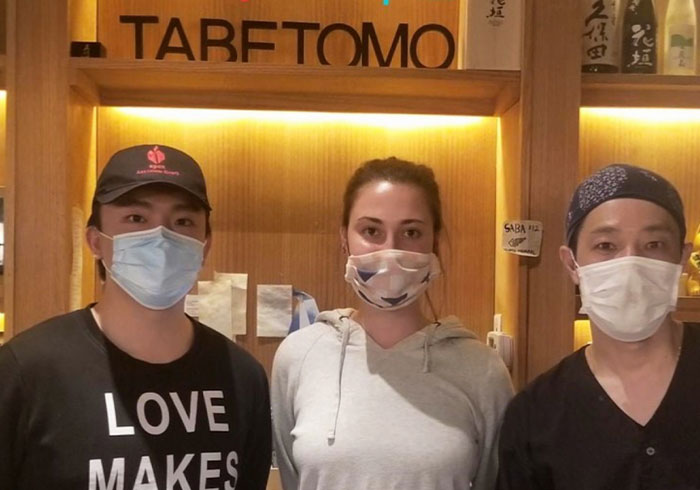
Chia Pan ’14, Founder of TabeTomo
Pan founded TabeTomo, a premier Japanese dipping noodle restaurant located in East Village, New York. He talks about how COVID-19 forced him to reinvent his business model, why helping his employees through this time is so important, and how he’s serving up some gratitude for health care workers on the front lines of the pandemic.
What message would you like to give to the Babson Community right now?
CP: We can’t predict the future, but we can maintain a positive attitude when facing adversities. Babson has taught me to think outside of the box, take calculated risks, and stay positive. My Babson network has provided tremendous support by offering advice, resources, donations, and words of encouragement, all of which enabled me to overcome fear and self-doubt during times of uncertainty.
How did you adapt to COVID-19 restrictions?
CP: Before the coronavirus, TabeTomo operated only as a full-service restaurant. It was not set up for take-out or delivery as we were solely focusing on providing the best dine-in experiences. However, the Coronavirus changed our original business model. As we searched for new ways to sustain our revenues and retain our employees, we pivoted and repurposed the restaurant by setting up deliveries with Caviar and other food delivery services providers. We also created a new catering menu and started looking for B2B opportunities. Managing this rapid change to business structure was challenging as it required cooperation and alignment of interests from my staff, suppliers, and delivery partners.
Are you taking any extra steps to support your employees?
CP: TabeTomo’s growth can be primarily attributed to the investments we made in our employees. Since the inception of TabeTomo in 2018, we have focused on installing a collaborative and collegiate culture. We treat our employees fairly and respectfully, which has translated into great efficiency and loyalty. As a result of the coronavirus, we were forced to reduce our team by almost 90%. Informing the employees that they could no longer work was one of the most difficult conversions in my entrepreneurial journey. Instead of getting paralyzed by the situation, we sought new ways to keep our doors open. To support our employees, we are giving 100% of net profit to them to help them get through this difficult time.
You’re participating in Feed Your Hospital by raising money to deliver meals to healthcare workers on the frontline of COVID-19. Were you surprised by the support and donations you’ve received?
CP: My friends, classmates, family members, teachers, and colleagues saw the fundraiser and extended their hands to support TabeTomo and its initiatives. It was heartwarming to see the community coming together for a shared mission. To date, we have delivered over 500 meals to healthcare workers at local hospitals. We are on track to reach our goal of delivering 1,000 meals by early May. In addition, we rehired seven employees and we plan to bring back more people.
What has been most rewarding about participating in Feed Your Hospital?
CP: Partnering with Feed Your Hospital has not only allowed us to retain our key employees, but also create meaningful social values. It was rewarding to see the team working tirelessly to prepare meals for healthcare workers. While we cannot cure the illness, we hope that our food can send our warmest gratitude to those who work in the frontline of COVID-19. Also, it has been a wonderful experience collaborating with other Babson alumni Lena Wu (’16) and Tina Xiao (’17) on this initiative.
How do you decompress during these stressful times?
CP: I recently took my first yoga/meditation class through Zoom. It was a great way to internalize problems, alleviate stress, and find inner peace.
What are you most looking forward to once social distancing is no longer in effect?
CP: I miss seeing and hanging out with my family, friends, and colleagues. I can’t wait to catch-up with them in-person and let them know how important they are in my life.
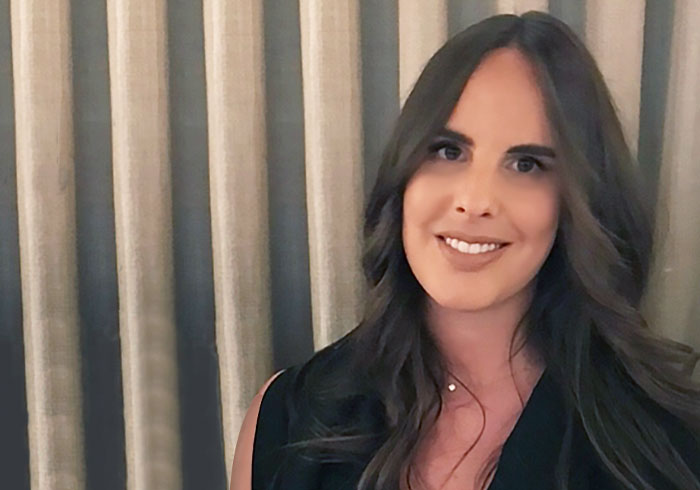
Allison Grekin ’13 of Moviing
Moviing is an online subscription-based fitness program offering on-demand yoga, barre, dance cardio classes and more. Based out of the U.K., Grekin is helping people everywhere active while confined to their homes and tells us how her experiences at Babson inspired her to help people.
How have you found creative ways to reach people now stuck at home during this global health crisis?
AG: Ever since the COVID-19 outbreak we’ve been running offers so that everyone is able to benefit. We want to make sure people stay active and healthy. We’ve also partnered up with Gabrielle Caunesil, influencer and founder of clothing brand La Semaine Paris, to bring our audiences free Instagram Live barre and meditation classes 4 times each week.
What advice do you have for business owners during these unprecedented times?
AG: It is a tough time for all businesses—especially smaller ones. My one piece of advice is to be creative. Think about ways to make your business stand out. Plan your business strategy for the future and think outside the box.
We’re surrounded by a lot of negative news right now. What’s something positive that happened to you this week?
AG: Being able to be so close to our community on social media, and agreeing on this partnership with Caunesil to reach more than 1.5 million people.
How do you calm down after a stressful day?
AG: After a long stressful day or after sitting for a long time at a desk I love doing Aurora Bowkett’s Stretchy Release Flow class on Moviing.
What book are you currently reading?
AG: Crossing the Chasm by Geoffrey Moore.
What class or professor at Babson influenced you the most?
AG: This is a tough question because I’ve genuinely been inspired by so many professors at Babson. However, if I had to narrow it down to one it would be Professor John Fisher and his Brand Management class. He would always emphasize how critical it is for brands to create an emotional connection with their customers. Emotional connections vary from one customer to another depending on their cultural backgrounds. “Think Global, Act Local” is a concept I’ve been very carefully implementing at Moviing.
Do you have any message to show your fellow alumni that we are all #OneBabson?
AG: I grew up in Paris and decided to leave for the U.S. for my undergraduate degree. Leaving Paris meant leaving my friends and family behind. Although I was anxious, the entire Babson Community embraced me. I was able to connect on a deep intellectual level with my teachers and met so many exciting people. I remember thinking to myself, “This isn’t just a school, this is a family.” So in that sense, I guess Babson really taught me the true meaning of “community”. I left school with a whole new perspective on the effect that humans can have on humans, which is why I started my own business.
Sianna Elise ’18 of FÀNDÉ
FÀNDÉ is an online women’s clothing line based in Liberia. It blends traditional prints with modern styles to create unique looks. It also partners with local artisans and businesses to foster entrepreneurship in growing economies. And with its initiative, The Give Back, FÀNDÉ puts the profits from “giveback items” towards purchasing school supplies for children in Monrovia, Liberia.
What is the most rewarding aspect of running FÀNDÉ?
SE: Launching FÀNDÉ has allowed me to showcase and exercise all parts of my personality. I love that I can be creative and strategic bringing value and solving problems. Owning a clothing line allows me to put my creative ideas to use when designing looks, website graphics, and Instagram themes.
How do you to relax?
SE: While working in Liberia, I often go to the beach when I need to relax or decompress. In the warm weather, I often feel the sun helps relieve my stress and instantly picks up my mood. I often bring my laptop and work on the beach. When visiting my family for Christmas in New Jersey, I would often complain about the gloomy sky. I also am an extrovert, so a night out with friends after a long day erases any worry.
What is your favorite Babson memory?
SE: F&E CWEL was a big part of my Babson experience and the source of many of my friendships. During my freshman year we had a bonding event in Reynolds where we painted and talked. At the end of the exercise, I had five abstract canvases that I hung up in my dorm room in North. The people I sat with making those paintings are still my friends. Those paintings filled my room with joy year after year. I brought them with me to Liberia, and they fill my apartment with the same warmth.
What bad habit do you struggle to give up?
SE: I’m a night owl. When I started FÀNDÉ, I would stay up until 4 am thinking about clothing ideas, writing notes on website changes, and creating a marketing strategy. Although this routine helped me get the business started. It is not healthy to stay up that late, looking at a laptop and getting 5 hours of sleep! I wish I could say I don’t do that anymore but it happens at least once a week!
What’s the best thing to happen to you this week?
SE: Completing my FÀNDÉ beach photoshoot. The day was very stressful, but in the end, it all worked out and turned itself around. I got some great photos for content on my Instagram @thefandefeel.
Ebru Ipekci '93 of Butterfly Chocolate
Butterfly Chocolate is a world-class boutique chocolate brand featuring handmade chocolate collections and pastries that are sold online and at trendy cafés in Istanbul, Turkey.
What has been the biggest challenge in running your own business?
EI: The business you create becomes your baby, you want to take care of every aspect of it by yourself. It takes time to understand that you have to know how to delegate.
What has been most rewarding about it?
EI: To create a brand from scratch and to see people enjoying it.
Tell us something you learned at Babson that has helped you most?
EI: To know the difference between the balance sheet and cash flow.
What’s one piece of advice you would give Babson alumni?
EI: When you’re an entrepreneur there will be times when you say I want to exit. Keep on going if you believe in it.


